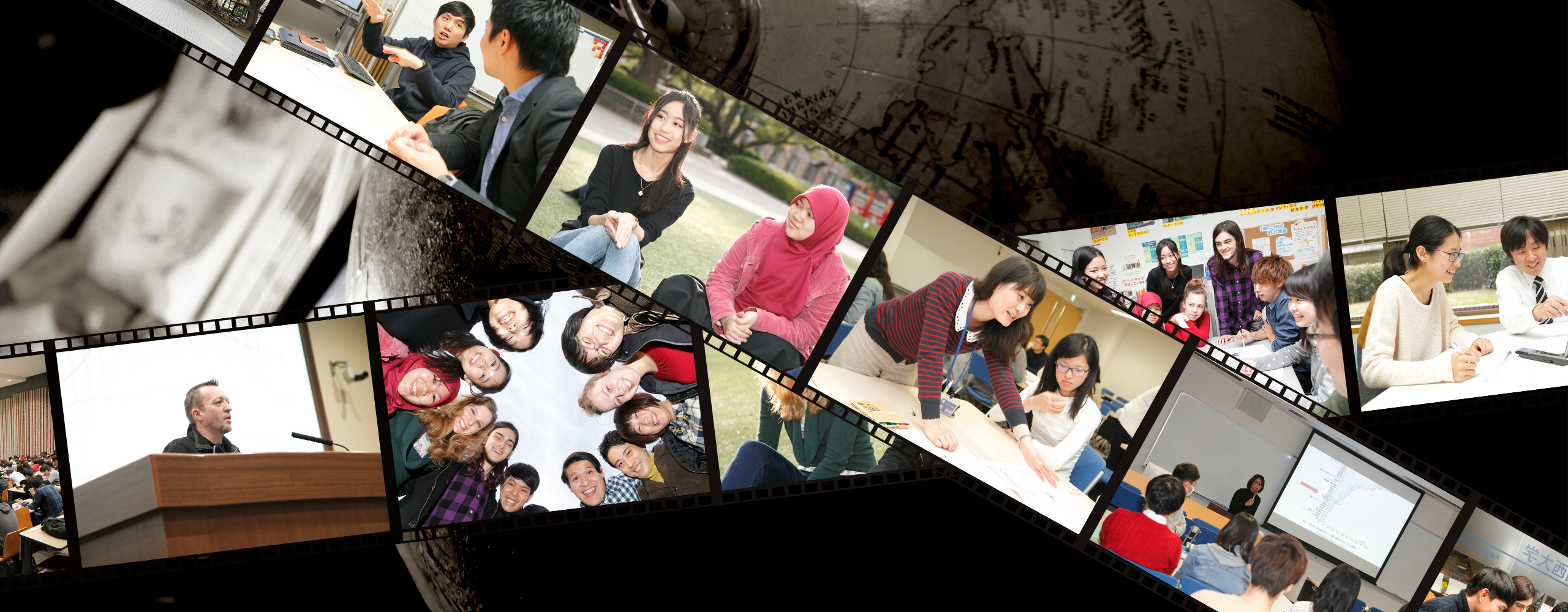

Major internationalization efforts at Kansai University
Kansai University Global Frontier Program
Wide-ranging efforts for encouraging next-generation global leaders
In academic year 2014, Kansai University launched its “Kansai University Global Frontier (KUGF) Program” and “International Cooperation Service Learning Program” for the purpose of equipping students with capacities required of next-generation global leaders in various international fields. The KUGF Program opened KUGF courses taught in English. Forty-two of these courses were offered in AY2014, 72 in 2015, and 82 in 2016, which were taken by 642 students in AY2014, 1,577 in 2015, and 2,227 in 2016, demonstrating exponential growth. KUGF currently offers “Global Frontier” courses under the eight specialized modules listed below, plus “Skill-Up for Studying Abroad” courses, and “Japanese as a Second Language” courses.
The International Cooperation Service Learning Program offered hands-on learning in international cooperation, composed of theoretical courses for studying theories of international cooperation, and practical courses for volunteering abroad. Both the KUGF Program and International Cooperation Service Learning Program have now been integrated into “Global Courses,” created as part of the AY2016 reorganization of general education courses, all of which are open to undergraduate students of all year levels and departments, and are continuing to expand and develop. Furthermore, in April 2016 an International Education Support Office staffed by international education experts opened to promote the aforementioned courses, support the launch of courses taught in English, support Collaborative Online International Learning (COIL) for distance-learning students at overseas universities, and promote international Problem Based Learning (PBL).

Launch of study-abroad support website GLOBAL NAVI
KU has opened a website called GLOBAL NAVI designed to speedily and effectively deliver information useful to students expecting to study abroad. The new site provides information on study abroad programs offered by KU, on host universities, and on programs for brushing up language skills.
▶Visit the GLOBAL NAVI website
Development of short-term overseas programs
To offer cross-cultural experiences to greater numbers of students, KU developed and conducted nine new overseas programs in AY2015. The nine programs were also offered in AY2016 after reorganizing them to make them more accessible to students with diverse language skills and overseas experiences.
Launch of graduate school dual degree (DD) programs
KU has instituted dual degree (DD) programs for graduate school students, which allow students to obtain degrees from both KU and overseas graduate schools through credit exchange and other means. A dual degree agreement was signed in February 2015 between Yeungnam University Graduate School Program of East Asian Cultural Studies and KU Graduate School of Letters, Graduate School of Foreign Language Education and Research, and Graduate School of East Asian Cultures. Student exchanges are also taking place between the University of Giessen (Justus Liebig University Giessen) and the KU Graduate School of Science and Engineering Master’s Degree Program, which entered into a dual degree agreement in September 2015.
Creation of a global scholarship and financial support program
This program was created in November 2015 as a new framework for promoting internationalization of KU undergraduate and graduate school departments. Designed to encourage student mobility—such as sending abroad KUGF and international program students, and students studying toward degrees offered in English, and accepting to KU outstanding students from abroad—the three-year program is in place until and including AY2017.
Creation of global education promotion centers
KU is currently working to develop its existing overseas offices into global education promotion centers, which will not only host abroad specialized educational programs KU excels in, but also serve as venues for seminars, fieldwork, internships, and other intercultural immersion prorams for Japanese students.
In early July 2016, KU’s Taiwan office, located within Cheng Shiu University, offered a certificate program incorporating distance learning. In September of the same year, KU’s Bangkok office, located within Chulalongkorn University, offered satellite lectures in collaboration with students and faculty members of both universities.
Activities for CARES-Osaka (Communal Actions for Resident and Employment Support by Osaka)
CARES-Osaka is an initiative adopted for MEXT’s FY2015 Project for International Students’ Living Environment and Job Search Support. Also part of KU’s 130th anniversary project, CARES-Osaka aims to increase Osaka’s degree students from abroad, offer them job placement support so that more of them can pursue careers in and around Osaka after graduation, and support the creation of environments conducive to their wellbeing as members of the local community. The wide-ranging activities of CARES-Osaka, conducted in partnership with the community, government, businesses, and universities, include strengthening the employment and living environment support offered to international students; recruiting excellent students from abroad; training global talent for Japanese businesses at home and abroad; and supporting exchanges between international students and the community.
CARES-Osaka is an Osaka-wide initiative led by a consortium composed of Osaka University, Osaka Prefecture University, Osaka City University, Osaka-based companies, local governments, and other bodies.
▶Visit the CARES-Osaka website
Posted October 2017





























